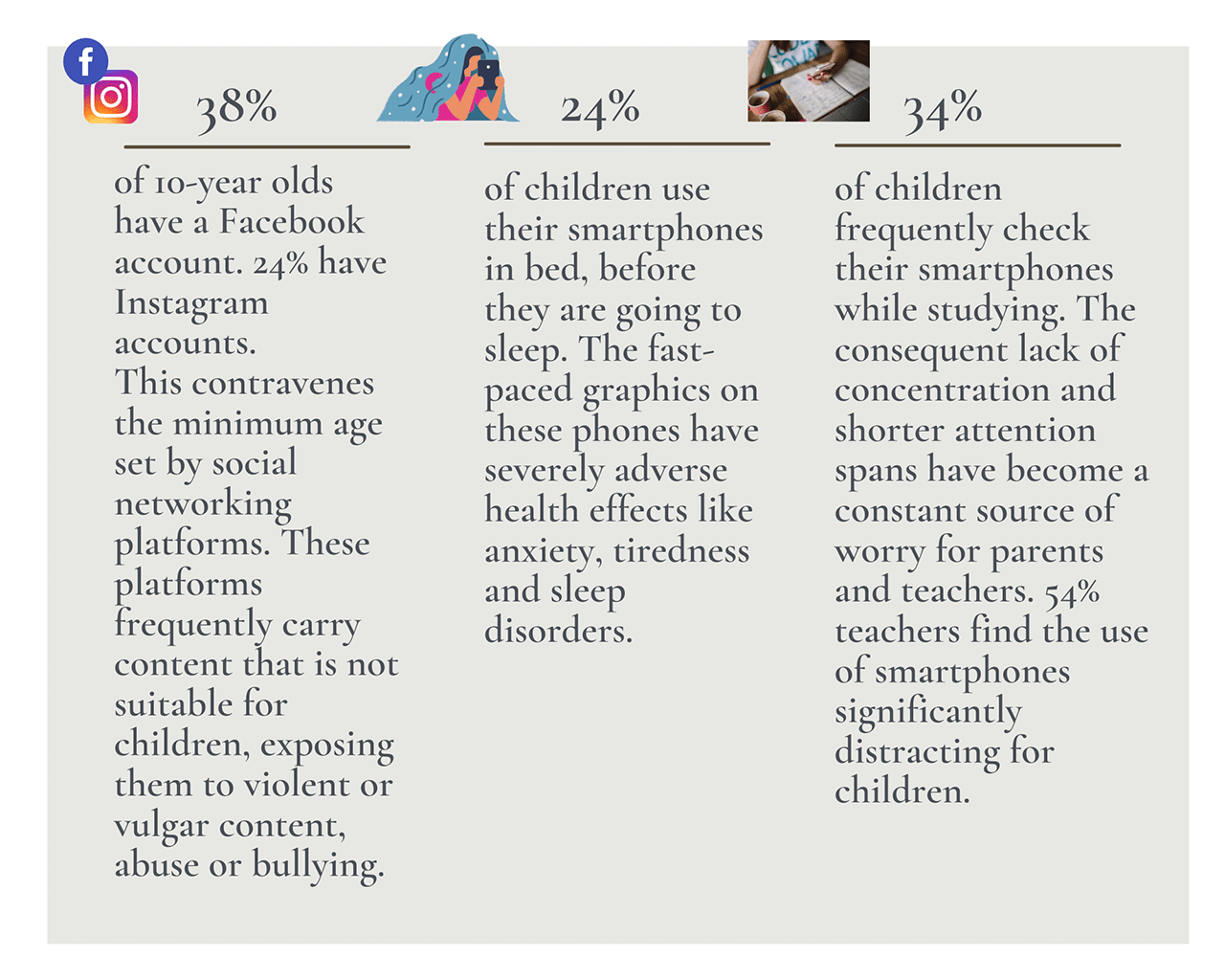
❝9 in 10 children agree that they live in a world that is ‘addicted to cell phones’.
— NCPCR Report, July 2021
Effect of use of mobile phones and internet access devices on children
India’s apex child rights body, the National Commission for Protection of Child Rights (NCPCR) released a report in July 2021 that studied the physical, behavioral and psycho-social effects of the use of mobile phones and other internet access devices on children. This comes in the wake of concerns being expressed by both experts and parents on the prolonged use of devices for educational and recreational purposes in the wake of the pandemic. Below are highlights from the study.
How children are accessing devices
- While 60% of the children use their parents’ phone to access the internet, a significant 30% of children in the age of 8-18 years already have their own smartphone.
- 21% of the children are using internet devices for games, 31% for music and 40% use messaging apps like WhatsApp
- When quizzed about the features children like using on smartphones / internet devices, only 10% liked to use them for online learning. Whereas 53% liked to use them for messaging apps like WhatsApp, Facebook, Instagram, and Snapchat.
How online access is affecting their wellbeing

- A large percentage of 10-year-olds have Facebook (38%) and Instagram (24%) accounts. This is an alarming sign because it contravenes the minimum age set by social networking platforms. These platforms frequently carry content that is not suitable for children, exposing them to violent or vulgar content, abuse or bullying.
- 24% of children use their smartphones in bed, before they are going to sleep. The fast-paced graphics on these phones have adverse health effects like anxiety, tiredness and sleep disorders.
- 37% of children frequently check their smartphones while studying. The consequent lack of concentration and shorter attention spans have become a constant source of worry for parents and teachers. 54% teachers find the use of smartphones significantly distracting for children.
- 3 out of 4 children think that COVID-19 has negatively impacted their education. 9 in 10 children agree that they live in a world that is ‘addicted to cell phones’.
How we can help children deal with this crisis
- Parents and adults around children need to monitor the use of digital devices. They need to openly discuss issues arising from excessive exposure and help children develop other forms of social interaction and leisure. Along with this, a lot of attention needs to be paid to their physical health by way of nutritious food, healthy eating and exercise habits.
- Schools need to seriously relook at the way education is being offered online. There is a need to create greater spaces for the creative stimulation of children, and spaces for them to engage in interaction with peers and teachers for effective learning. They also need to equip themselves and children with internet safety tools and behaviors.
- Parents need to educate themselves better about apps and features available that restrict internet use and protect children from accessing harmful content on the internet. Awareness programs are needed to help children and parents deal with issues of cybercrime and bullying when they arise, and reach out to cybercrime and juvenile protection agencies in their locality when needed.
- Parents need to be role models for children when it comes to healthy habits. They need to limit their own use of smartphones and television for entertainment. They need to create spaces for greater interaction and doing things together so that children can develop the necessary life skills.
- National and state level agencies need to work together to strengthen the support available for dealing with internet addiction and cybercrime related issues.
For further details, you can access the full NCPCR report here
Related Content
Gadget addiction and stress Management
Practical professional advice on dealing device addiction issues in children
Dr. Vivekanandan, District Psychiatrist, SalemLiving & Learning in the 21st Century
Meenakshi speaks of her 30+ year journey in helping children learn and thrive
Meenakshi Umesh, Founder-Director, Puvidham Learning CenterWell-being of Parents and Children
A veteran psychiatrist shares her thoughts on parents' and children's wellbeing
Dr. Srikala Bharath, Psychiatrist and Prof., NIMHANS (retd.)Online Learning and Well-being of Children
An experienced educationist shares her views on coping with online work and learning
Padma Srinath, Veteran educationist
